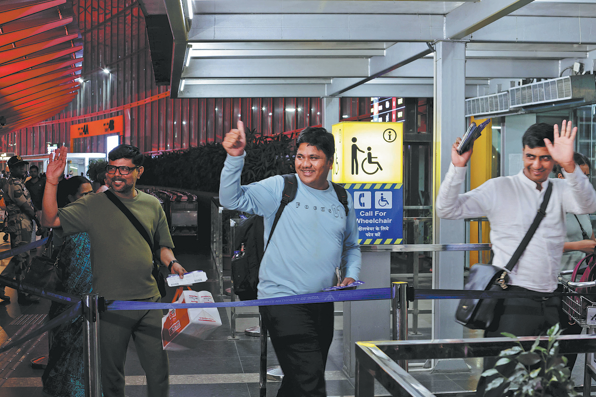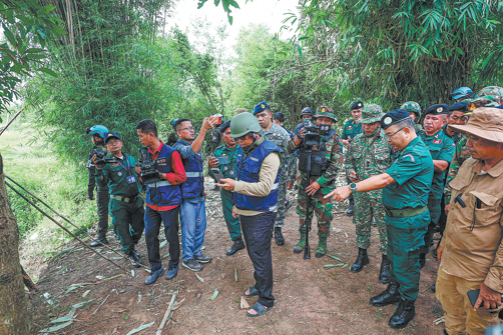China-Thailand ties continue to grow in scope
Thai king makes state visit as bilateral cooperation enhanced across sectors

From Thailand's tropical shores to Earth's frozen frontiers, marine scientist Sujaree Bureekul has chased the limits of knowledge — from Bangkok to the Arctic and the Antarctic.
She is one of the few Thai scientists to have worked at both poles, a feat made possible through scientific cooperation between Thailand and China.
"We gained a lot from the (Antarctica) trip," said Sujaree, an assistant professor of marine science at Chulalongkorn University in Bangkok. "Without collaboration with China, we would never have been able to embark on such a remarkable polar expedition. It gave us firsthand knowledge about the Antarctic."
At a symposium in May marking the arrival of China's icebreaker Xuelong 2 in Thailand, she said the research partnership offered valuable lessons for Thai scientists, and could help Thailand respond to the challenges of climate change.
"We hope China and Thailand can continue such scientific collaboration and engage more young scientists," Sujaree said. "This kind of cooperation can serve as a 'blue model' for regional partnerships across Southeast Asia."
Thriving partnership
As Beijing and Bangkok celebrate the 50th anniversary of diplomatic ties this year, cooperation now spans various sectors — from polar science to smart farming, electric vehicles to cultural exchange.
That partnership reached another historic moment this week as King Maha Vajiralongkorn Phra Vajiraklaochaoyuhua became the first Thai monarch to make a state visit to China, beginning on Thursday.
Diplomats and analysts say the trip symbolizes both nations' shared desire to deepen a relationship often described as "one family" — a phrase that has defined their diplomatic vocabulary for decades.
Zhang Jianwei, China's ambassador to Thailand, said the king's decision to make China the first major country he visits on an official trip "fully demonstrates the great importance Thailand's top leadership attaches to advancing China-Thailand relations".
"The two countries' leaders jointly ushered China-Thailand relations into a new stage of building a more stable, more prosperous and more sustainable community with a shared future," Zhang wrote in an article published on Wednesday.
China hopes to take this visit as an opportunity to "carry forward the friendship between the two countries and open an even more splendid new chapter for the next 50 years of bilateral ties", he added.
The royal visit comes just two weeks after President Xi Jinping met with Thai Prime Minister Anutin Charnvirakul on the sidelines of the APEC Economic Leaders' Meeting in Gyeongju, the Republic of Korea.
Xi emphasized China's readiness to align development strategies with Thailand and share its development experience in the new era, while calling for accelerated construction of the China-Thailand railway and expanded cooperation in agricultural trade, the green economy and digital innovation.
Chayodom Sabhasri, an associate professor on the faculty of economics at Chulalongkorn University, said, "It's a very exciting moment for the king and queen of Thailand to pay a state visit to China — the first in history."
"The visit will lift bilateral relations to a higher level and present new opportunities for cooperation in science, technology, innovation and education," he added.
Chayodom noted that a growing number of Chinese tech companies — from Huawei and Xiaomi to electric-vehicle makers BYD, Great Wall Motor and Xpeng — have expanded into the Thai market in recent years.
"For people in Thailand, we also look forward to cooperation on high-tech, particularly on space research and aircraft development. Also, joint development by Thailand and China on artificial intelligence will be given high expectations," he added.
China has remained Thailand's largest trading partner for 12 consecutive years and the top market for its agricultural exports and fruits, according to the Chinese embassy in Bangkok.
Bilateral trade reached $114.3 billion in the first three quarters of 2025, up 17 percent year-on-year.
Agriculture remains central to the Thai economy, employing 12 million people and accounting for about 8 percent of GDP. With nearly half of the country's arable land still farmed traditionally, the sector has become a new testing ground for Chinese technology.
In Danmakamtia village in Kanchanaburi Province, Somboon Songwainiaw, a 51-year-old farmer, has seen that potential firsthand. As the owner of more than 22 hectares of farmland, he was among the first in Thailand to adopt Chinese smart farming technologies.
Two of his tractors are now equipped with intelligent steering systems made by a Chinese company. Guided by satellite navigation and sensors, the system enables autonomous operation along optimized routes for specific crops and field conditions.
"It has helped me cut costs from 1,600 baht ($50) to 200 baht per rai (1,600 square meters)," Somboon said.
Inspired by the success, Somboon also began using Chinese drones for pesticide spraying. "In just four hours, a drone can spray about 40 hectares. The operation is easy, and the efficiency is remarkable," he said.
Investing in certainty
Saravoot Yoovidhya, CEO of TCP Group, the Thai conglomerate behind Red Bull, said the company firmly believes that investing in China is investing in long-term certainty. TCP has invested 4.36 billion yuan ($614 million) in the Chinese market over the past five years.
"China's high-quality development is injecting strong momentum into the global economy," he said. "We will remain committed to concrete actions that strengthen China-Thailand friendship and work hand in hand with partners across sectors to build a contemporary bridge of mutual understanding and deeper people-to-people ties," he added.
Korn Dabbaransi, former Thai deputy prime minister and president of the Thai-Chinese Friendship Association, said, "For decades, the saying that 'China and Thailand are one family' has been deeply rooted in the hearts and minds of both peoples."
"Our relations go far beyond friendship — we are family," Korn said. "We are now working closely in future-oriented industries such as artificial intelligence, healthcare, environmental protection and electric vehicles."
He also highlighted the high-speed railway project linking China, Laos and Thailand, expected to be completed by 2030. "Beyond boosting tourism, the project will further strengthen trade and connectivity between China and Thailand," Korn said.
"We look forward to even stronger and closer ties with China over the next 50 years, and hope to see more exchanges between our young people."
Contact the writers at xuwei@chinadaily.com.cn

































